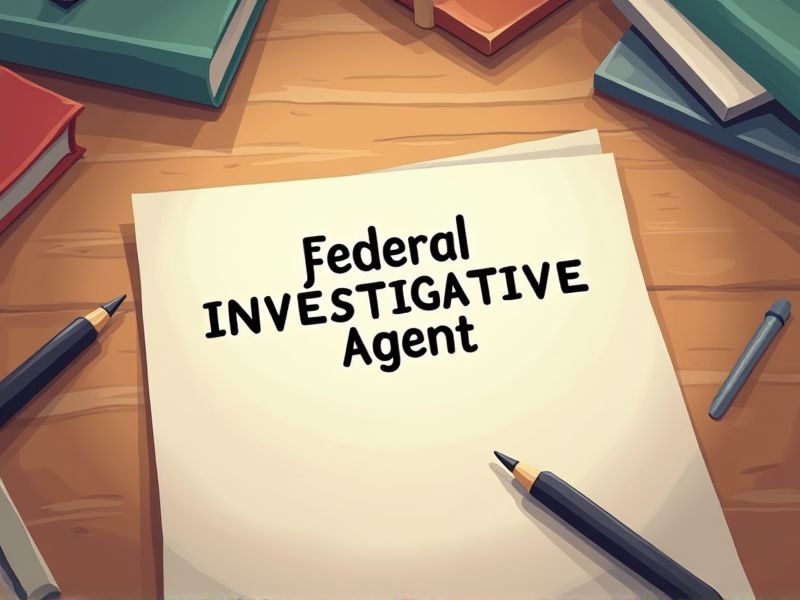
Federal Investigative Agents work on complex and sensitive cases that require a high level of expertise and credibility. Certain certifications validate the agent's proficiency in areas like cybercrime, forensic analysis, and counterintelligence. Holding these certifications ensures the agent is equipped with the latest skills and adheres to industry standards. Here are some important certifications necessary for a Federal Investigative Agent.
FBI Special Agent Training Certification
FBI Special Agent Training Certification is essential because it ensures agents possess the necessary skills for federal investigations. The training program covers various aspects such as forensic science, legal procedures, and intelligence gathering, which are critical for solving complex crimes. Certification confirms that agents have met the rigorous standards required to handle sensitive national security matters. Without this certification, agents may lack the credibility and proficiency needed to effectively conduct investigations and uphold federal laws.
Certified Fraud Examiner (CFE)
Certified Fraud Examiner (CFE) credentials underscore a deep understanding of financial transactions and fraud schemes, essential for a Federal Investigative Agent tackling complex fraud cases. Expertise in fraud prevention, detection, and deterrence equips the agent with critical skills to navigate and mitigate economic threats effectively. CFE training offers comprehensive insights into the legal elements of fraud, aiding in precise and legally sound investigations. This qualification enhances the agent's credibility and efficiency, strengthening case outcomes and reinforcing public trust in federal investigative processes.
Professional Certified Investigator (PCI)
The Professional Certified Investigator (PCI) credential enhances an agent's expertise in managing and conducting comprehensive investigations, critical for ensuring federal investigative processes meet rigorous legal and ethical standards. PCI certification signifies a mastery of skills such as evidence gathering and interview techniques, which are essential for accurate and thorough federal investigations. It also ensures agents are up-to-date with the latest investigative methodologies and technology, directly impacting the efficiency and reliability of their work. Moreover, possessing PCI certification can heighten credibility and trustworthiness, both crucial for achieving cooperation from witnesses and other stakeholders in federal cases.
Certified Protection Professional (CPP)
Certified Protection Professional (CPP) certification enhances a Federal Investigative Agent's understanding of comprehensive security management, which aids in efficiently safeguarding government assets. The CPP credential demonstrates advanced capabilities in threat assessment, essential for identifying and mitigating potential security risks. Thorough knowledge gained from the certification supports federal agents in developing robust security protocols, essential in high-stake government environments. Having CPP certification builds trust and credibility among peers and ensures adherence to the highest professional standards and practices in security management.
Certified Digital Forensics Examiner (CDFE)
A Certified Digital Forensics Examiner (CDFE) is crucial for a Federal Investigative Agent because it equips them with the expertise to recover and analyze digital evidence critical for solving cybercrimes. The specialized training helps ensure accuracy in identifying digital fingerprints that can link individuals to criminal activities. Furthermore, the CDFE's skills help maintain the integrity and admissibility of digital evidence in court, which is vital for successful prosecutions. The increasing complexity and volume of cyber threats demand that federal investigations possess the highest competency in digital forensics.
Certified Cyber Crime Investigator (CCCI)
The increasing sophistication of cyber crimes necessitates a Certified Cyber Crime Investigator (CCCI) for federal agencies as they bring specialized skills to tackle complex digital threats. Cyber criminals continually evolve their tactics, making it essential for agents to have advanced knowledge and techniques to stay ahead. Comprehensive expertise offered by CCCI ensures accurate data collection and evidence analysis, which is crucial for successful legal proceedings. The presence of certified investigators strengthens the agency's ability to secure digital information, protecting national interests from cyber threats.
Certified Financial Crimes Specialist (CFCS)
The complexity of financial crimes such as money laundering and fraud demands specialized knowledge, which the Certified Financial Crimes Specialist (CFCS) provides to Federal Investigative Agents. Having the CFCS certification helps agents effectively identify and analyze intricate financial records and transactions that might otherwise go unnoticed. The credential equips agents with techniques and strategies that improve the chances of uncovering deeply embedded financial schemes. Possessing CFCS certification also enhances the credibility and legitimacy of an agent's findings in legal proceedings.
Intelligence Analysis Certification (IAC)
The Intelligence Analysis Certification (IAC) enhances an agent's ability to assess and interpret complex data, effectively distinguishing between relevant and irrelevant information. This certification provides a standardized level of expertise, ensuring agents have critical analytical skills crucial for national security. Agents with IAC are better equipped to collaborate across various federal departments, which improves inter-agency communication and efficiency. Agencies value IAC as it assures a consistent approach to intelligence gathering, which significantly supports informed decision-making processes.
Certified Interviewing Professional (CIP)
The role of a Certified Interviewing Professional (CIP) equips a federal investigative agent with enhanced skills for extracting reliable and accurate information from subjects. Proper interviewing techniques can lead to more successful investigations by minimizing misinformation and enhancing truth verification. Rigorous training in interview methodologies helps agents adhere to legal standards, reducing the risk of evidence being deemed inadmissible in court. The CIP credential ensures that agents remain current with best practices and evolving tactics in the field of criminal investigation.
Counterterrorism Certification (CTC)
Federal Investigative Agents require Counterterrorism Certification to enhance their ability to assess and mitigate terrorism-related threats effectively. This certification ensures agents are up-to-date with the latest counterterrorism strategies and techniques, which is crucial in preventing attacks. A Counterterrorism Certification promotes uniform standards and practices, facilitating cooperation across various federal agencies. The credential also supports agents in responding promptly and accurately to emerging terror threats while maintaining national security.
Summary
When you, as a Federal Investigative Agent, obtain additional certifications, you can expect to enhance your skills and knowledge base significantly. This professional development often leads to increased opportunities for career advancement and specialized assignments. Enhanced qualifications can also strengthen your credibility and authority in investigative work. As a result, you become a more valuable asset to your agency and may achieve greater job satisfaction and recognition.
